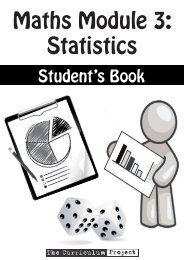Teacher's Guide - The Curriculum Project
Teacher's Guide - The Curriculum Project
Teacher's Guide - The Curriculum Project
- No tags were found...
Create successful ePaper yourself
Turn your PDF publications into a flip-book with our unique Google optimized e-Paper software.
GlossaryThis glossary is in alphabetical order. <strong>The</strong> meanings of words given relate to the context of this module. <strong>The</strong> wordsmay have other meanings in other contexts.activist (noun): a person who uses direct actionto try to change things.allocation (noun): sharing out.appropration (noun): to take something illegallyand without payment.asset (noun): an item of value.auction (noun): a sale of property to the personwho pays the most moneyback-breaking (adj): very difficult, physicallyexhausting.to bid (verb): offer a price for somethingbidder (noun): a person who bids in an auctionboycott (noun): a refusal to do something, orbuy something, out of principle.byproduct (noun): something produced inaddition to the main product.Chair (noun): position of leadership.cocaine (noun): a drug made from the coca plant.to colonise (verb): to take over, populate andrule an area of land.compensation (noun): money given to someonewho has suffered an injustice.to compete (verb): to be in competition.to comply (verb): to do what you are asked todo.to condemn (verb): to say that something iswrong.condition (noun): a requirement attached tosomething given.constitution (noun): the basic principles andlaws of a nation.to contaminate (verb): to pollute.corruption (noun): illegal use of power, orposition, for personal benefit.to cultivate (verb): to grow.coup (noun): a taking of power by force, usuallyby the military.customs (noun): the agency that administers tax(‘duty’) placed on goods crossing borders, andsearches for and tries to prevent the smugglingof untaxed or illegal goods.debt (noun): money that is owed.democratise (verb): become more democratic.demonstration (noun): a gathering of people whoprotest against something.development (noun): advancement, improvement.discrimination (noun): denying someone equaltreatment on the basis of age, skin colour,nationality, religion, gender, etc.dispute (noun): argument.domestic (adj): home, as in country.to dominate (verb): to have a lot of control over.drastic (adj): very severe and sudden.to dump (verb): to get rid of unwanted things.elite (noun): privileged group of people, often inpositions of power and influence.to eradicate (verb): to get rid of, destroy.essential (adj): absolutely necessary.to expand (verb): to grow, get bigger.exploitation (noun): to make use of someone’slabour unfairly, sometimes through force.extortion (noun): using authority and threats totake money from people illegally.extrajudicial (adj):not authorised by law.fake (adj): not real, not original, not authentic.to fire (verb): to dismiss someone from their job.fixed exchange rates: a system where the exchangerates of the currencies of a group of countries arefixed so that they do not change. This is usuallydone to increase economic stability in a region.formation (noun): creation.to found (verb): to start, create.garage (noun): a small building (usually one room)used for storage, or in which a car is parked. Somepeople use this space for a ‘home-office’.grant (noun): money given to support an individualor a country.gross (adj): total, whole.income (noun): the money that people receive fromtheir salary and other investments.indicator (noun): a value/statistic which shows thehealth of an economy.inequality (noun): not being equal.to inspire (verb): to give someone hope and thedesire to try to do something.integrate (verb): join together.intensive agriculture (adj): production of a lot offood from a small area of land using farmmachinery and chemical fertilisers.interest (noun): fee paid (usually every month)when you borrow money.to interfere (verb): to get inolved in something totry to influence it.to intervene (verb): to get involved in.isolated (verb): separated from others.isolation (noun): being cut off or separated fromothers.jurisdiction (noun): the limits in which law orauthority can be used.landless (adjective): without land.to lay off (verb): when an employer tells anemployee to leave their job.<strong>The</strong> <strong>Curriculum</strong> <strong>Project</strong> ECONOMICS: an introduction - Teacher’s <strong>Guide</strong>76



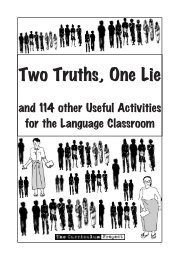
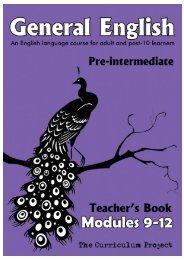

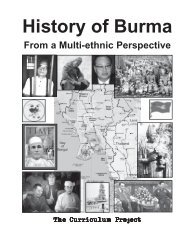





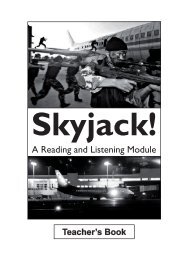
![[Eng] Nov 2012 DRAFT - The Curriculum Project](https://img.yumpu.com/45590859/1/184x260/eng-nov-2012-draft-the-curriculum-project.jpg?quality=85)


